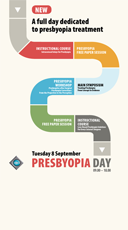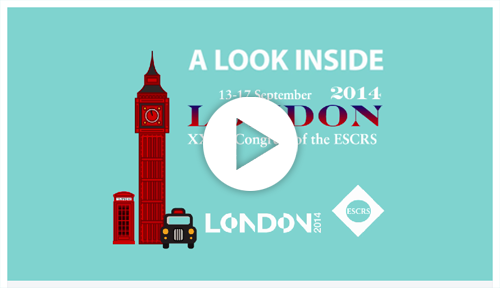One-step vs two-step FemtoLASIK procedure to manage post-penetrating keratoplasty astigmatism and refractive errors: 3 years follow-up
(results will display both Free Papers & Poster)
Session Details
Session Title: LASIK II
Session Date/Time: Tuesday 08/09/2015 | 14:00-16:00
Paper Time: 14:06
Venue: Room 10
First Author: : L.Mosca ITALY
Co Author(s): : L. Guccione L. Salvatore O. Caporossi T. Maria Emanuela C. Aldo
Abstract Details
Purpose:
To investigate visual and refractive outcomes of post-penetrating keratoplasty astigmatism and refractive errors with femtosecond-assisted LASIK performed in 1 step (lamellar cut and excimer ablation at the same time) or 2 steps (first lamellar cut and then delayed excimer ablation).
Setting:
Cornea and Refractive Surgery Service, Ophthalmic Department, A. Gemelli Polyclinic, Catholic University of “Sacro Cuore”, Rome, Italy.
Methods:
In this retrospective non randomized comparative study, 27 eyes of 26 patients (15 male, 11 female; mean age: 41 yrs ± 13.6 SD, range: 23 to 69 years.) underwent to LASIK procedure assisted by a femtosecond laser (Femto-LASIK) to correct high post-PKP refractive errors, at least two years after complete suture removal. Group 1 (one-step Femto-LASIK) included 14 eyes and Group 2 (two-step Femto-LASIK), 13 eyes. The follow-up was 3 years.
Results:
The mean refractive spherical equivalent (MRSE) improved from 3.97D ± 2.34SD to 0.91D ± 1.65SD in Group 1 and from 5.22D ± 2.47SD to 1.46D ± 1.43SD in Group 2. A statistical significant improvement in refractive cylinder was obtained in both groups, but it was a little more evident in Group 2 (60% vs 65% of preoperative values). Best spectacle-corrected visual acuity improved in both groups (BSCVA Group 1: from 1.42 logMAR ± 0.56SD to 0.07 logMAR ± 0.25SD; BSCVA Group 2: 1.28 logMAR ± 0.63SD to 0.05 logMAR± 0.27SD).
Conclusions:
Femtolaser-assisted LASIK, performed in one or two steps, is a reasonably safe and predictable procedure in reducing high refractive errors in post-PKP corneas, with acceptable stability over time. Visual and refractive outcomes were found to be a little better in the two-step technique.
Financial Interest:
NONE





